Becoming a commercial real estate broker requires earning a sales license and gaining experience to complete the real estate broker coursework. Similar to becoming a residential agent, the commercial real estate sector, including properties like office buildings, hotels, industrial centers, and retail spaces, presents unique challenges and requires specialized expertise. To become successful in this role, agents should create commercial marketing materials, establish a commercial-centered network, and obtain specific certifications and designations.
Whether you’re entering the real estate field as an agent or working toward becoming a broker, enrolling in a state-approved real estate school is crucial. Colibri Real Estate stands out as one of the few online schools offering tailored courses for each U.S. state. It provides diverse learning options, such as self-paced and livestream courses, along with study tools like flashcards, e-books, a dictionary, and interactive sessions with instructors.
Visit Colibri Real Estate – Use Promo Code: FSB30 for 30% off
If you’re wondering, “How do I become a commercial real estate broker?” here are four steps (and an optional fifth step) you can follow:
1. Earn Your Real Estate Salesperson License
The first step of learning how to become a commercial broker is to become a real estate salesperson in your state. In most states, it’s necessary to have one to two years of industry experience as a salesperson before becoming a broker or managing broker. Therefore, as you establish yourself in the real estate industry as an agent, build skills and knowledge to help you succeed in the commercial sector.
Licensure requirements vary by state, but the process of how to get a real estate license (regardless of whether you’re specializing in residential or commercial real estate) generally includes the following:
- Meeting legal requirements (age, education, citizenship)
- Completing real estate prelicensing coursework
- Getting fingerprints and a background check
- Passing the state real estate exam
- Choosing a sponsoring brokerage
- Acquiring errors and omissions insurance
- Submitting your real estate license application
When searching for a sponsoring broker to affiliate with, prioritize a brokerage that specializes in the commercial niche over the residential. To build a successful commercial real estate business, it is essential to start by gaining a strong background in the industry through your first role as a commercial salesperson, as it provides the experience, mentorship, and industry knowledge needed for growth.
Read more about starting as a commercial real estate agent and choosing the right brokerage for you in our article How to Get a Commercial Real Estate License in 7 Steps.
2. Gain Experience & a Reputation as a Commercial Real Estate Agent
During your time as a commercial agent, it is crucial to maximize your learning opportunities. This involves gaining experience in branding, marketing, and working with commercial properties to develop comprehensive expertise in all aspects of the business. By doing so, you will be well-prepared to take on the challenge of starting your own commercial real estate business when the time comes.
Brand Yourself for Commercial Real Estate
As a newly licensed real estate agent, most people will assume you work with residential properties simply because it’s the most common and familiar. This makes it critical to create a complete branding plan to show commercial clients that you are a trained expert with commercial properties.
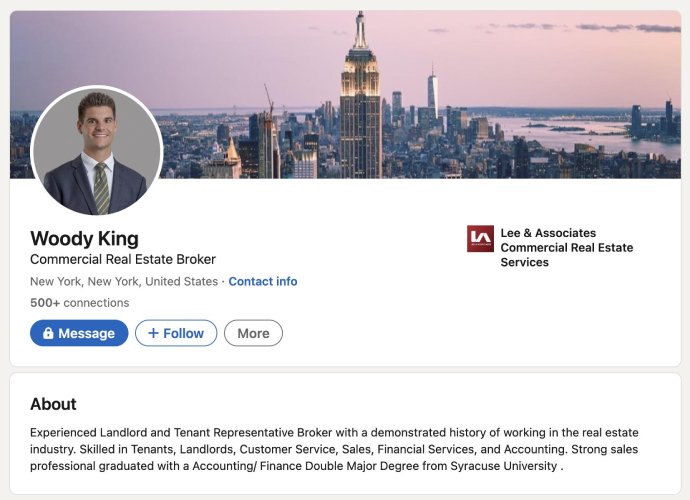
Example commercial broker profile (Source: LinkedIn)
You will need to add the title of “commercial real estate agent” to your real estate bio and social media profiles to attract the right audience. But, you’ll also need to accentuate your role by branding yourself with other materials. These include the following:
- Logo: Your logo should showcase commercial industry imagery. For example, instead of including a residential home, including a skyscraper or retail store image would be more appropriate.
- Business cards: Your business card should look consistent with the elements of your brand image to ensure recognition. For example, it should prominently feature your logo and maintain consistent font and colors.
- Direct mail (flyers, brochures, letterhead): Direct mail should resonate with your target audience through compelling design and clear calls to action so your audience knows how to respond to you.
- Social media: Make sure your social media profile accurately reflects your brand, effectively communicates your services, and uses relevant and high-quality visual content.
- Website: Your website should have user-friendly navigation to make it easy for visitors to find the information they need and look professional and trustworthy. It should also contain relevant and factual content.
- Landing page: Your landing page should have a clear and compelling headline that immediately captures visitors’ attention and effectively communicates the key features, benefits, and value you offer.
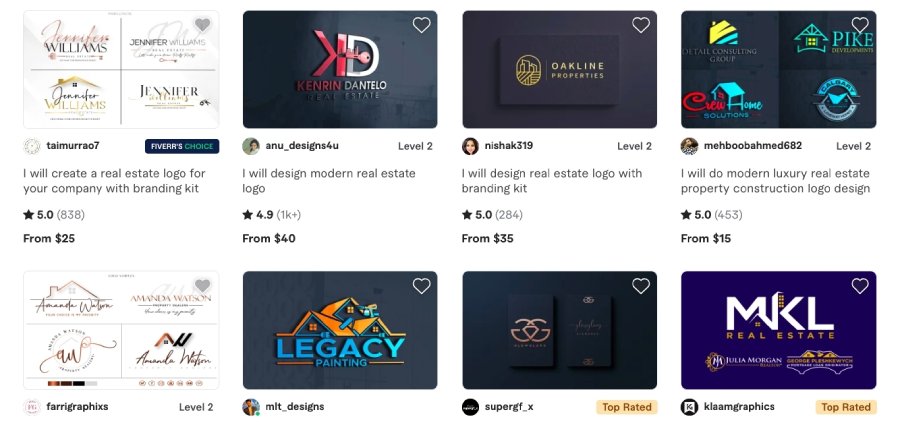
Check out freelancers for real estate branding on Fiverr
If branding isn’t your area of expertise, Fiverr is a convenient platform to find and hire a professional branding or graphic design freelancer. On Fiverr, you can review portfolios, read client reviews, and conduct interviews before making financial commitments. Numerous freelancers offer comprehensive branding packages that include logos, brand colors, fonts, and even templates for flyers, social media, and landing pages.
Work in a Niche Market
Commercial real estate encompasses a wide range of property types, including offices, retail buildings, multi-family homes, industrial properties, hospitals, hotels, and land development. However, to gain valuable industry experience, we recommend focusing on a specific niche within the commercial landscape. By specializing in a particular market, such as restaurants or factories, you can become the go-to salesperson for those particular businesses.
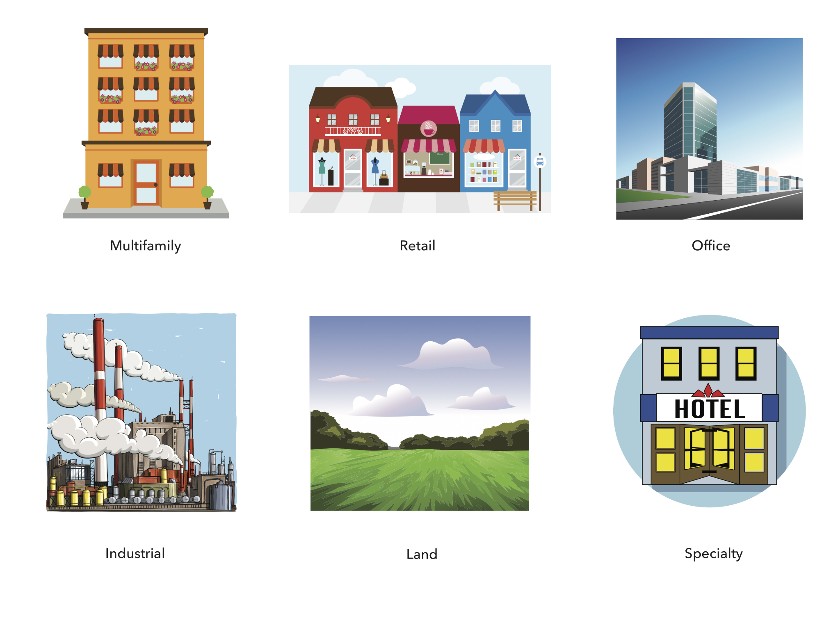
Varieties of commercial properties (Source: The BB Group)
As you learn how to become a commercial real estate broker, you can choose a specialty based on your background, location, or personal interests. For example, if you have previous experience working in the restaurant industry, strategically focus on buying, selling, or leasing restaurant space. Similarly, if you have corporate work experience in office buildings before, targeting that market may be a strategic choice.
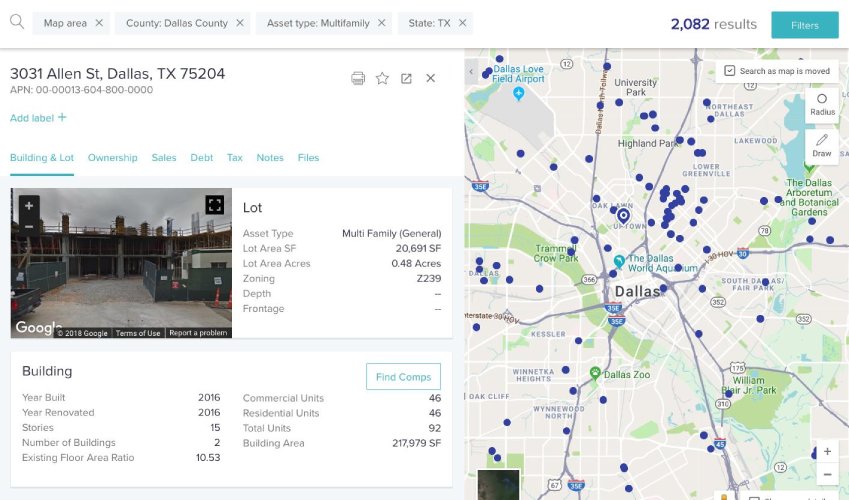
Commercial property search (Source: Reonomy)
However, identifying clients with specific needs can be challenging. Fortunately, commercial real estate databases provide access to valuable market and contact data that can assist you in locating and reaching potential clients and properties. For example, Reonomy utilizes artificial intelligence (AI) and predictive analytics to optimize your advertising efforts, reaching clients and business owners at the ideal time in the sales process.
Learn more details about the 6 Best Commercial Real Estate Databases for 2023 to see which database you can use for your business.
Use Commercial Marketing & Lead Generation Tools
Even with the best commercial real estate broker education and mentorship, real estate professionals cannot expect immediate marketing success after obtaining their license without additional effort. Building effective marketing and lead generation systems that attract the right clients and minimize time spent at the computer takes time. When you’re learning how to become a commercial real estate broker, leave room for trial and error.
To generate commercial real estate leads, utilize commercial databases, social media advertising, and a custom website with landing pages. Maximize your efforts using a robust commercial real estate customer relationship manager (CRM) to optimize marketing, networking, and lead generation opportunities. Below are some CRM providers that you can consider:
Providers | ||||
|---|---|---|---|---|
Best For | Fast access to data analysis | CRM for commercial real estate brokers | Affordable integrated software | World-wide commercial real estate information, analytics, and news |
Top Features |
|
|
|
|
Starting Price | Approximately $119 per month | $15 per user, per month | $10 per user, per month | Charges depend on what you use |
Learn More |
For more about commercial lead generation, visit Top 12 Ways to Generate Commercial Real Estate Leads.
3. Get Commercial-specific Education & Network With Others
To maintain your real estate license, fulfill the state-specific continuing education requirements. Familiarize yourself with the local requirements and allocate time for the necessary courses. Keep in mind that continuing education topics related to commercial real estate may be limited because many topics are residential-related.

Examples of commercial real estate certification (Source: National Association of Realtors)
Continued learning and professional development are essential for real estate agents and brokers at any stage of their careers. Enhance your expertise by pursuing reputable commercial real estate courses, certifications, and designations. Some widely recognized options include:
- Development Specialty Track (The Ward Center for Real Estate Studies)
- Certified Commercial Investment Member (CCIM designation)
- Discovering Commercial Real Estate (National Association of Realtors)
- Land University (REALTOR’s Land Institute)
- Certificate of Advanced Study in Commercial Real Estate Development (NAIOP)
- Certified Commercial Advisor (National Association of Real Estate Advisors)
In addition, networking and making connections with other people in the industry will help you learn and build relationships. Joining commercial real estate brokerages or associations like the National Association of Realtors (NAR), Urban Land Institute (ULI), and the Commercial Real Estate Development Association (NAIOP) will help you connect with other professionals actively involved in transactions.
By actively pursuing opportunities to learn and grow, you will naturally reap the rewards in your real estate career. Enhancing skills, such as sales, communication, relationships, and marketing, can lead to increased productivity, reduced stress, enhanced respect, and higher income.
4. Obtain Your Broker’s License
After meeting the required time as a real estate agent, you can begin the process of becoming a real estate broker. Check your state’s specific requirements, but generally, obtaining a broker’s license follows similar steps as obtaining an agent’s license:
- Meet legal requirements (age, citizenship, experience)
- Complete prelicensing education
- Take the broker’s exam
- Submit your license application
Every state has different requirements for aspiring brokers to complete real estate education courses, with a range of 60 to 150 hours of required coursework. Here are a few examples of broker licensing requirements in select states:
State | Broker License Requirements |
|---|---|
Arizona |
|
Delaware |
|
Kentucky |
|
Michigan |
|
North Dakota |
|
To know the licensing requirements in your state, visit our list of state-by-state broker license requirements. | |
Since the requirements to become a broker are more demanding, choose a course format that suits your learning style from online real estate schools like Kaplan and Colibri Real Estate. These schools offer self-paced reading materials, live webinars, video courses, and live online classes. Additionally, most course providers require passing an exam for their school as well as the state licensing exam.
After passing the test from your real estate school and doing all the steps on how to get into commercial real estate, register for the licensing exam through your state’s real estate commission website. On the test day, follow the exam center’s requirements by bringing your ID and leaving personal items and calculators at home.
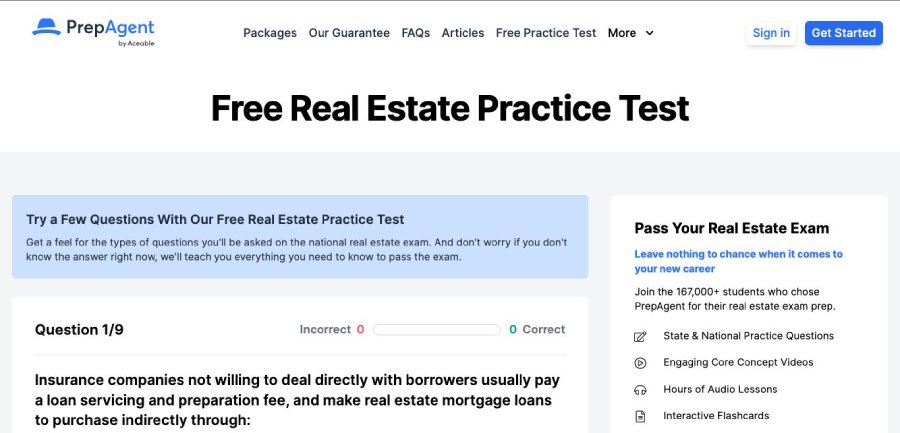
Take a free real estate practice test on PrepAgent (Source: PrepAgent)
To be fully prepared for the exams, enroll in exam prep courses like PrepAgent. With a money-back guarantee and thousands of 5-star online reviews, PrepAgent offers online training, study tools, state-specific practice questions, and live webinars. The school offers comprehensive resources to increase your chances of passing the test on your first try.
For more tips to feel confident on exam day, take a look at our article on how to pass the real estate broker exam in eight steps.
Optional Step 5: Build Your Commercial Real Estate Brokerage
Knowing all the steps of how to become a commercial real estate broker gives you the freedom to continue working at an already-established brokerage or start your own. Before starting your own brokerage, weigh the pros and cons and assess your readiness for the responsibilities it entails. You must also understand the specific real estate laws and regulations governing commercial transactions and businesses.
Having followed these steps on how to get into commercial real estate, obtaining your broker’s license signifies that you already possess sales experience, a network of commercial professionals and clients, and an operational lead generation and marketing system. This presents an opportune time to further invest in your brokerage branding and marketing efforts, which may include:
- Search engine optimization (SEO)
- Content marketing with blogs or video content
- Email marketing campaigns
- Social media marketing
- Advertising campaigns
Take a look at the advantages and disadvantages and take our quiz to help you decide if you’re ready to open your own brokerage in our 8-step Guide to Starting a Real Estate Brokerage.
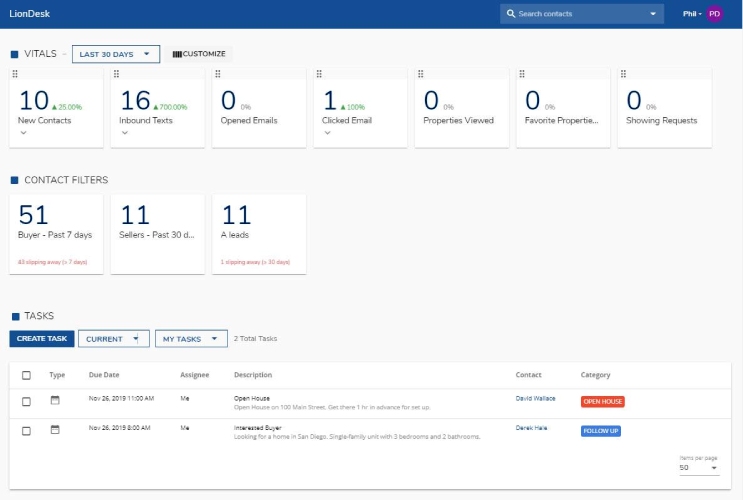
A look at LionDesk dashboard (Source: LionDesk)
As a broker, a robust real estate CRM is crucial for organizing, automating, and managing your contacts, conversations, and deals. LionDesk is a powerful and user-friendly real estate CRM suitable for both individual brokers and teams. It provides efficient tools tailored for commercial real estate professionals, including call management and tracking, lead import integrations with real estate platforms, and digital and print marketing collateral. Try LionDesk for free for 30 days.
Bottom Line
Commercial and residential real estate brokers earn the same license, but focus on different types of transactions. The steps on how to become a commercial real estate broker are challenging at first, but joining professional groups, establishing a strong marketing system and brand, and continuously learning can make it a rewarding career choice.
Frequently Asked Questions (FAQs)
A commercial real estate broker actively assists clients in buying, selling, and leasing commercial properties—acting as a mediator between property owners or landlords and potential buyers or tenants. They possess deep market knowledge, provide guidance and advice, create property listings, and represent buyers or tenants in negotiations to secure favorable terms and conditions.
Commercial real estate refers to properties used for business or income-generating purposes, such as office buildings, retail spaces, industrial facilities, and multi-family apartment complexes. On the other hand, real estate is a broader term encompassing all types of properties, including residential, commercial, and vacant land.
A commercial real estate broker actively assists clients in buying, selling, and leasing commercial properties, acting as a mediator between property owners or landlords and potential buyers or tenants. They possess deep market knowledge, provide guidance and advice, create property listings, and represent buyers or tenants in negotiations to secure favorable terms and conditions.
To generate commercial leads as a commercial real estate broker, network to build connections and gain referrals and establish an online presence through a professional website and social media platforms. Further, you can also utilize online marketing techniques like SEO and create informative content. Consider cold calling and direct mail campaigns to reach out directly to potential clients. These proactive approaches can help you identify and engage with prospects in the commercial real estate market.